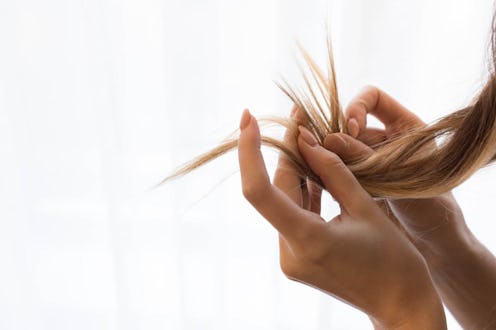Life
6 Women Share What They Want Others To Understand About Substance Use Disorder

When celebrities are transparent about their substance use, as Demi Lovato has been before and after overdosing in July, many everyday people feel inspired to share their own journeys with substance use disorder, and to have tough conversations about addiction IRL.
Though substance use disorder is recognized as a "brain disease" by the American Psychiatric Association, and research shows that substance use rewires your brain like any other mental illness, stigmas surrounding addiction still persist. Many people still refuse to recognize substance use as a mental health issue, continue to use stigmatizing language, and push to continue the criminalization of people struggling with addiction. This can have devastating effects — studies have shown stigma can make it more difficult for women with substance use disorder to find housing and jobs, as well as receive appropriate substance use treatment.
However, some folks have sought to change the narrative about recovery — taking to the internet to discuss the importance of lifesaving medications like Narcan, the unique paths individuals take to maintain sobriety, and to challenge the myths that keep people with addiction from seeking support. Here's what six women who live with substance use disorder wish others understood about this mental illness.
1Sarah
"As a woman, I spent 29 years believing I was broken due to my past. One day it hit me — if I am in control of myself fully, then I have the ability to dictate a future full of love, compassion, and fulfillment. For me, this meant giving up the substances I once depended on for false hope. Today, I feel more alive than ever," explains Sarah, a Blockchain and A.I. Community Director.
"Sometimes, it takes a decade (or, a few decades) to realize the depth of our emotions, because of how easy it is to find false happiness from different substances," she says, adding that, "Our society perpetuates this by enabling a culture dependent on alcohol and other substances as a means for fun and adventure."
2Liz
Liz, a musician, says, "One thing many people disagree with me on is that Alcoholics Anonymous (AA)/Narcotics Anonymous (NA) recovery programs don’t work for everyone. In early recovery, I had so much pressure to attend AA, and it really made me feel worse off. Recovery is entirely individual, and for me, it was about being gentle with myself, and getting out of that perfectionist, all-or-nothing mindset."
"Some people swear by it, so I don't want to discredit that. But, for me, it was not good. Recovery for me was about creating my own happiness," she says.
3Kate
"Substance use disorder and alcohol use disorder are just that: medical disorders that require real, evidence-based treatments free from stigma, and judgment," Kate, a nonprofit professional, tells Bustle. "I can't help that what are normal activities for some people — like having a beer, or smoking a joint — spiral my brain (and my life) into chaos," she explains. "It seems that it doesn't matter how far from actively using I move, or how traditionally 'respectable' I become, some people can't accept that I am capable of being a good person. Or, that I am worthy of dignity, care, and respect — simply because I have these diseases."
4Camille
"I want people to know that being a mother and a recovering addict is extremely difficult, but it doesn’t make you a bad mother," explains Camille, a skip tracer. "I relapsed when my son was one, and I was an amazing mother then. And, I am still an amazing mother now to my almost four-year-old."
She adds that, "Addiction is a disease, and it can hinder you in so many ways, and can make you feel undeserving of motherhood — but it doesn’t make you a bad mother."
5Julia
Julia, a college student, cautions that giving unsolicited advice to people with substance use disorder can hinder their recovery process, rather than help. “In my head I tell myself that I have to do everything perfectly, otherwise I’m not doing it right, and people will judge me. I want people to know that when someone doesn’t have a lot of sobriety, at least for me, people telling me what I 'should,' and 'shouldn’t' be doing makes me feel really horrible about myself, and my sobriety." She adds, "The only person giving me suggestions should be my sponsor — unless I ask someone else directly.”
6Stephanie
"For me, being a woman in recovery is all about following the guidance and the footsteps of the women that came before me, so that I can better help the women who seek recovery after me. It’s about being there for other women, and showing them how powerful things are when women come together for a common purpose," says Stephanie, a housing coordinator for a sober living home.
"Too long, we’ve put each other down. But, I have seen so many beautiful things happen when us women in recovery come together fight addiction as one, with our many different skills," she explains.
7
Breaking down the stigmas that surround women who are paving their own journey to recovery is essential to creating a community that is accepting of those with substance use disorders. When all is said and done, people struggling with substance use disorder deserve the same respect, access to mental health care, and compassion that is given to those struggling with any other kind of health issue.